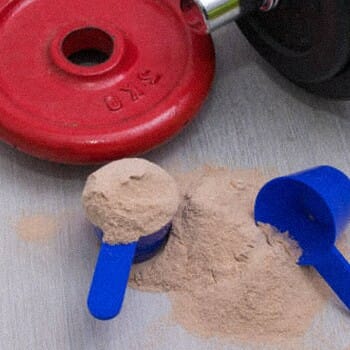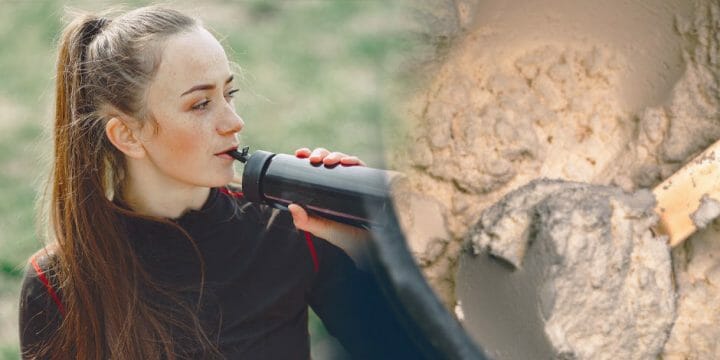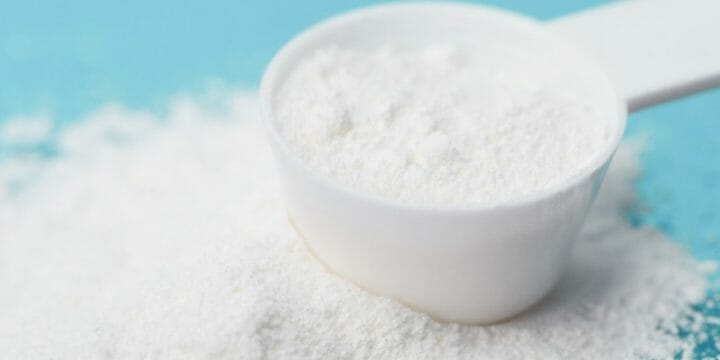With over ten years of experience as a fitness coach and extensive research, I can confidently state that creatine is not a steroid.
Creatine is a naturally occurring compound in the body, and my expertise aligns with numerous studies confirming its safety and efficacy as a supplement for improving exercise performance.
Continue reading to discover all the essential information about creatine and how to incorporate it into your workout routine for increased muscle gains.
Quick Summary
- Creatine isn't a steroid but an amino acid derivative that the body naturally produces and is found in certain foods.
- Supplementing with creatine may help to enhance lean muscle mass, cognitive function, and fitness wellness.
- Ten days of supplementation with creatine showed a 6 percent increase in bench-press performance and a 15 percent improvement in bike-sprinting performance.
- As a fitness trainer, it's important to follow the recommended dose of creatine, maintain a balanced diet, and consistently adhere to your workout schedule.
Is Creatine Considered a Type of Steroid?
No, creatine is not a type of steroid. According to research published by the National Institute of Health, creatine has a different chemical structure than anabolic steroids [1].
Furthermore, the same research suggests that, unlike steroids, creatine functions differently and is not associated with the hormonal effects characteristic of steroids.
As a fitness trainer, I strategically integrate creatine into our workouts to boost gym performance and accelerate results without any unwanted side effects.
What is Creatine?

Creatine is an amino acid that can be converted into phosphocreatine and is commonly used as a supplement to enhance athletic performance.
According to the Cleveland Clinic, creatine is made naturally by the body and can also be found in certain foods, particularly protein-rich foods.
Furthermore, the same research suggests that this natural compound helps supply energy to the muscles, helps build strength, and promotes brain health [2].
Is It Safe?

Yes, creatine is completely safe to take, considering it's a molecule naturally present in our bodies, with 95% stored in muscles, as per the National Institute of Health [3].
Unlike anabolic steroids, creatine doesn't mimic testosterone, allowing its acceptance by professional sports leagues and the International Olympic Committee.
While our diets and natural creatine levels can't maximize muscle stores, supplements elevate them to 140–150 mmol/kg. This stored creatine boosts energy during intense workouts.
Excess creatine is broken down into creatinine, metabolized by the liver and kidneys, and excreted in urine.
What Does It Do to Your Body?

Creatine aids in increasing the body's energy levels, enhancing muscle strength, boosting brain function, and thereby improving athletic performance and overall health.
Other effects of creatine in the body include:
- Enhanced workload: Creatine allows for increased total work or volume in a single training session, crucial for long-term muscle growth.
- Improved cell signaling: Creatine aids in post-workout muscle repair and the development of new, larger muscles.
- Raised anabolic hormones: Creatine intake can help increase hormones, such as IGF-1, contributing to bigger muscles.
- Increased cell hydration: Taking creatine increases water content in muscle cells, enlarging the muscles.
- Reduced protein breakdown: Elevated creatine levels result in decreased protein breakdown, supporting muscle growth.
- Lower myostatin levels: Creatine allows for a decrease in myostatin levels, facilitating new muscle growth.
Creatine supplements can help enhance strength in older adults and boost phosphocreatine stores in the brain, potentially improving brain health and preventing neurological diseases.
3 Major Benefits of Creatine for Fitness

"Creatine should not be viewed as another gimmick supplement; its ingestion is a means of providing immediate, significant improvements."
— Matt Weik, Fitness Entrepreneur
Using creatine can provide you several fitness benefits, including:
1. Strength and Exercise Performance
According to research from the National Institute of Health, creatine increases ATP production, thus enhancing power, strength, and performance during intense workouts.
Furthermore, the same research found that incorporating creatine shows a 6% increase in bench-press performance and a 15% improvement in bike-sprinting performance after 10 days of supplementation in high-performing athletes [4].
2. Muscle Mass
According to a study published by the National Institute of Health, building muscle mass with creatine is effective in short- and long-term supplementation.
The study on weightlifters showed that creatine enhances muscle fiber growth 2–3 times more than training alone. The total body mass increased and also doubled with a one-rep max [5].
3. Quick Weight Gain
Research from the same health institute indicates that after one week of high-dose creatine use, users may experience a weight increase of 2–6 pounds, primarily due to heightened water content in the muscles [6].
Over time, body weight continues to expand as actual muscle growth occurs, stemming from muscle rather than fat, a positive adaptation for most athletes.
How Does it Affect Liver and Kidney?

Creatine can elevate blood creatinine levels, leading to the misconception that it can negatively affect the kidneys and liver.
A study published by the National Institute of Health found that staying physically active can prevent kidney and liver side effects from taking too much creatine for a long time [7].
Still, you have to be careful with creatine and sports nutrition in general if you have a history of kidney disease, and always follow the recommended dosage.
References:
- https://www.ncbi.nlm.nih.gov/pmc/articles/PMC7871530/
- https://my.clevelandclinic.org/health/treatments/17674-creatine
- https://www.ncbi.nlm.nih.gov/pmc/articles/PMC3407788/
- https://www.ncbi.nlm.nih.gov/pmc/articles/PMC8228369/
- https://pubmed.ncbi.nlm.nih.gov/10449017/
- https://pubmed.ncbi.nlm.nih.gov/9475647/
- https://www.ncbi.nlm.nih.gov/pmc/articles/PMC3761536/
About The Author
You May Also Like






